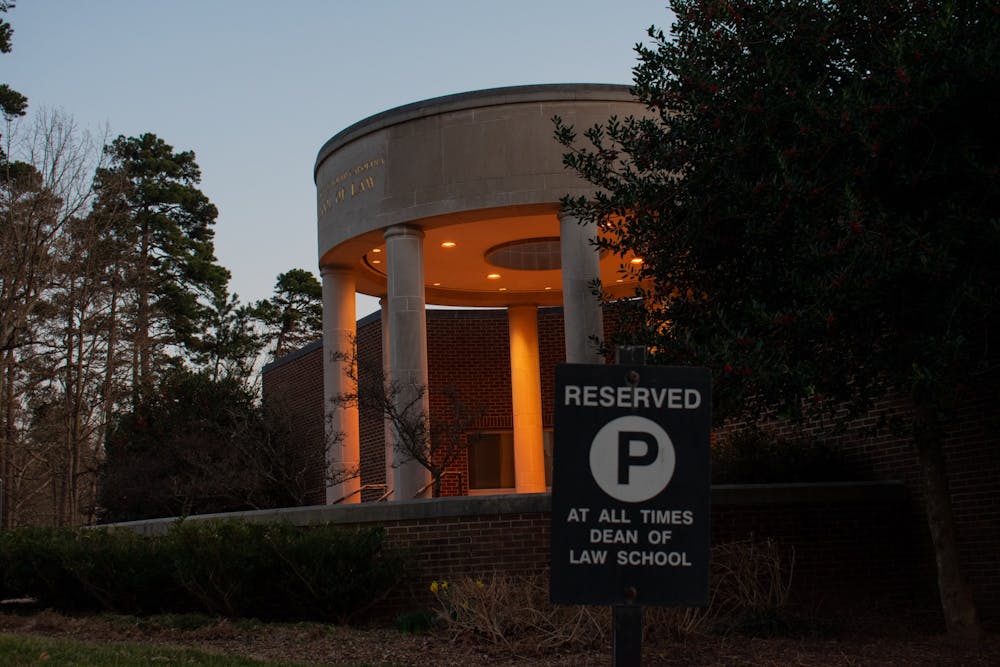Many law students rightfully criticize the field’s reliance on unpaid internships for training. But it is also true that many legal service providers simply do not have the funding to justly compensate their actual employees, let alone interns. Like any social service, our government is loath to provide proper funding. Nonetheless, while the war on unpaid internships rages, students still must find ways to fend for themselves.
Because first-year law students haven’t learned many practical skills yet, employers who can pay often provide far more opportunities to second-year students — especially those who they can plan to hire full-time upon graduation.
Many students view the limited funding available for these summer grants as part of a broader concerning trend in law school. While UNC offers this funding, it is more limited than it is at other schools. In fact, a survey by the National Lawyers Guild gave UNC one star out of five compared to other public interest stipends given by law schools.
First, UNC does not guarantee funding for qualifying students, so despite fundraising efforts, every year some students are inevitably rejected. Having guaranteed funding doesn’t just make the application process easier, it also impacts students’ internship prospects. It is much easier to get an offer and to accept one if you know that you’ll be getting funding for it.
Second, unlike some other schools, UNC does not include private public interest firms in their definition of “public interest” for the purposes of this grant and other programs.
“Even though we’re doing pro bono work, it doesn’t qualify because it’s not a 501(c)(3) or the government,” said first-year law student Jamie Marsicano. Even though Marsicano and her fellow intern will be doing pro bono work for victims of police brutality and people who have been accused of crimes, they are not eligible for a public interest stipend because they are working with a community lawyer, who is considered a “private” employer.
“The public interest grants have these bright-line rules that don’t fit for everyone,” Marsicano said. “While a district attorney’s office qualifies, ours doesn’t.”
University officials sympathize with students but insist that they are not divesting from public interest interns. While the amount of funding devoted to summer grants has gone down, the law school has increased the amount of scholarship money given to students, maintained its loan repayment assistance program and has been able to provide “bridge grants” that fund short-term fellowships for graduates to work in public interest positions.
Further, at the end of the day, University officials say that the decrease in funding for public interest summer grants has simply been a result of a change in demand for the grants. As the market fluctuates, in some years more summer positions are paid and in others, more are unpaid.
Despite the changes in funding available, the employment rate for graduating students, including public interest students, has remained constant and even improved. While all law students are encouraged to do legal work over the summer, part-time and short-term legal work is encouraged.
These budgetary issues also cannot be divorced from broader trends. Public and private schools across the country are still feeling the effects of the market crash in 2008.
“Between, say, 2005 and 2010, law school tuition has doubled,” said Associate Dean Bianca Mack. In the same period, the subsidized loans were replaced with Grad PLUS Loans. “All of that exploded when the market contracted with that last recession.”
To get the day's news and headlines in your inbox each morning, sign up for our email newsletters.
Associate Dean Kelly Podger Smith encourages students to reach out to her if they are having trouble securing funding for an unpaid summer internship, or have any concerns about gaining funding for their time at UNC Law.
“We’ve been able to help people piece this [together] a lot,” said Dean Smith. “There’s all kinds of different solutions and it’s not a one-size-fits-all.”
Many at the law school do a valiant job of supporting students, but the structural flaws in how Carolina Law supports public interest students must be remedied. If demand for summer grants has decreased, then that means that the University should be able to guarantee funds for more students. Further, there is no logical reason to bar all private employers from eligibility for public interest summer grants.
While an employer that earns profits from the work of an intern should be expected to pay for the position, students should be encouraged and supported in working on pro bono projects with solo practitioners when the work is undeniably in the public interest. These kinds of opportunities are otherwise unavailable to most students.
There are many factors that must go into budgetary decisions, some of which are indisputably valid. But public interest work is constantly devalued. It is devalued economically, in how different legal institutions are funded. It is devalued politically, in how public defenders and legal services are not invested in. It is devalued in labor, down to the extreme pay gap present even in summer internships.
The law school now has the opportunity to set a new pace for how public interest students are supported. Many students still choose to attend UNC instead of private institutions because of the public interest community here, but students don’t feel like this community is thriving. Instead, they feel responsible for fundraising to make up for an institutional problem.
Investing further into these programs so that public interest students can more reliably access training and educational opportunities must remain a priority for the law school.
@dthopinion
opinion@dailytarheel.com




